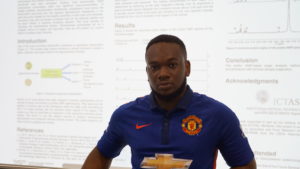DAC Student Spotlight: Chidubem Arachie

Chidubem Arachie, DAC Ph.D. student in computer science
As a computer science student at the American University of Nigera, Chidubem Arachie had spent a year as an exchange student at American University in Washington, D.C. Back in Nigeria, he graduated, taught high school math and computer science as a corpsman in the National Youth Services Corp in Lagos for a year and worked just shy of two years as a tax accountant at KPMG Nigeria.
Then he decided to take a serious look at Ph.D. programs. He said the EMBERS project at the Discovery Analytics Center is what drew him to Virginia Tech.
“I remember reading about EMBERS and thinking to myself how I would love to be involved in such a project, collaborating with researchers in various fields and schools,” said Arachie. “I was excited that Virginia Tech had such a center for interdisciplinary research and that my potential advisor, Bert Huang, was a DAC faculty.”
In 2017, he moved to Blacksburg to begin his Ph.D. focused on machine learning. Currently, he is working on a new algorithm — Adversarial Label Learning — that uses weak supervision to train a model robust to dependent/independent errors that can make accurate predictions without labeled data.
“The application of this line of research is limitless since, in the real world, labeled data is a limiting factor,” said Arachie. “Having access to a model utilizing only domain knowledge from experts is a useful tool for solving most problems.”
Arachie credits Huang with being a tremendous help in narrowing his area of research from the broad field of machine learning.
“Prior to starting the Ph.D. program I was interested in developing new algorithms to solve interesting real world challenges, but I was not sure how to go about it,” said Arachie. “After a lot of conversations with Dr. Huang, and through his relentless effort and guidance, I was able to focus on this area of machine learning research that combines theory and application.”
Arachie said the best thing about being a DAC student is having the opportunity to learn not only from his advisor but from others and being exposed to interesting work in various research areas.
“DAC creates an atmosphere that fosters interdisciplinary research and attending poster sessions gives me ideas about how I can apply my research to other fields and possibly collaborate with other labs within DAC,” he said.
His projected graduation date is Spring 2022, after which he would like to work in an industry research lab applying machine learning to solve real world problems.
“At some point I would also love to return to academia, maybe as an adjunct professor,” Arachie said.